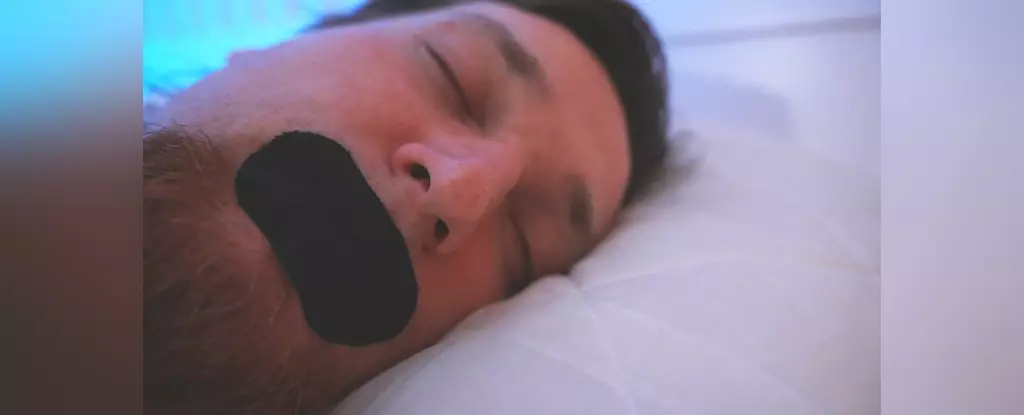In an age dominated by social media fixations and viral health hacks, the concept of “mouth taping” has garnered an unsettling amount of attention. Promoted by online influencers, this practice—wherein enthusiasts tape their mouths shut to promote nasal breathing during sleep—sounds innocuous, even beneficial, at first glance. Advocates claim that this method can address a host of ailments: it purportedly aids sleep apnea, enhances jawline definition, and improves oral health, all while offering a remedy for bad breath. The curiosity behind such simplistic solutions can be enticing, especially for those of us whose nighttime rest is frequently interrupted by the snores and gasps that accompany obstructive sleep apnea. However, thin strips of tape might widen the gap between actual health treatment and mere illusion—it’s crucial to evaluate both the scientific evidence and the potential risks involved.
Science Lags Behind the Hype
As researchers delve into the veracity of mouth taping, what emerges is a disconcerting lack of robust scientific evidence supporting its effectiveness. At best, limited studies reveal marginal improvements in conditions related to mild sleep apnea. Yet, the broader picture is less reassuring. Many of these studies suffer from fundamental flaws, including poor participant representation, inadequate follow-up, and insufficient accounting for confounding variables that can greatly impact the results. It’s alarming that mouth taping, despite its popularity, is regarded with skepticism in the scientific community. In fact, some studies paint a more troubling picture, underscoring the potential for serious health risks, particularly concerning individuals with nasal obstructions or more severe sleep apnea.
The Risks of Self-Diagnosis
The contemporary obsession with DIY health fixes, particularly in relation to sleep disorders, only amplifies the dangers of relying on anecdotal advice found in TikTok videos or Instagram posts. Mouth breathing is often symptomatic of deeper issues—whether physical obstructions in the nasal cavity, allergies, or more severe conditions requiring professional evaluation. To attempt to fix such complexities with something as simplistic as tape can be not only ineffective but potentially deadly. Those who cover their mouths at night risk asphyxiation or other respiratory complications if they fail to address the underlying cause of their symptoms. Furthermore, this superficial band-aid methodology can divert attention from seeking necessary medical care, leading to a worsening of health issues over time.
The Medical Community’s Cautionary Stance
While a small fraction of patients with mild obstructive sleep apnea may find minimal benefits from mouth taping, physicians and sleep specialists maintain a strong, cautionary stance against this trend. Rather than succumbing to the allure of viral solutions, experts advise comprehensive evaluations by healthcare professionals, who can better diagnose and address underlying health issues. Trusting social media influencers over qualified health professionals is a slippery slope, one where personal health becomes fodder for online trends rather than anchored in science and evidence-based practice.
Shifting the Narrative: Seeking Genuine Solutions
The discourse around mouth taping brings to light an urgent need for individuals grappling with sleep apnea or related issues to seek informed, researched guidance. Emphasizing personal agency in health is valuable; however, it is imperative that this agency is grounded in reliable medical expertise rather than fleeting internet trends. The public should be encouraged to access proper sleep studies and consult with qualified specialists who can navigate the complexities of sleep disorders responsibly and ethically. It is time to shift the narrative: prioritize genuine health solutions over superficial, trend-driven antics.
The current fixation with mouth taping as a supposed sleep remedy raises pressing questions about our collective approach to health and wellness in a rapidly evolving digital landscape. Societal trends can either empower or endanger; in the case of mouth taping, a critical reevaluation is certainly warranted.

